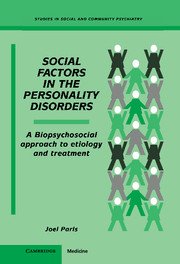Book contents
- Frontmatter
- Contents
- Foreword
- Introduction
- Acknowledgments
- 1 Overview
- 2 Personality Traits and Personality Disorders
- 3 Biological Factors
- 4 Psychological Factors
- 5 Social Factors – Methods
- 6 Social Factors – Mechanisms
- 7 A Biopsychosocial Model of the Personality Disorders
- 8 The Odd Cluster
- 9 The Impulsive Cluster
- 10 The Anxious Cluster
- 11 Treatment
- 12 Clinical Practice
- Epilogue: Summary and Research Implications
- References
- Index
9 - The Impulsive Cluster
Published online by Cambridge University Press: 05 May 2010
- Frontmatter
- Contents
- Foreword
- Introduction
- Acknowledgments
- 1 Overview
- 2 Personality Traits and Personality Disorders
- 3 Biological Factors
- 4 Psychological Factors
- 5 Social Factors – Methods
- 6 Social Factors – Mechanisms
- 7 A Biopsychosocial Model of the Personality Disorders
- 8 The Odd Cluster
- 9 The Impulsive Cluster
- 10 The Anxious Cluster
- 11 Treatment
- 12 Clinical Practice
- Epilogue: Summary and Research Implications
- References
- Index
Summary
Antisocial personality disorder
Phenomenology
Antisocial personality disorder (ASPD) has been an accepted category of mental illness for two centuries. The idea that there is a form of mental disorder characterized by callousness and criminality is probably universal in all cultures (Murphy, 1976). Many different terms – “moral insanity”, “psychopathy”, “sociopathy” – have been used in the past to describe its phenomenology. Although some writers (e.g., Blackburn, 1988) criticize the construct as a medicalization of “personal deviance”, there is a broad consensus in psychiatry as to its validity.
Since the definitions of antisocial personality disorder in DSM-IV, or of dissocial personality disorder in ICD-10 are similar, we will use them interchangeably. Both systems use primarily behavioral criteria for diagnosis. The criteria in DSM require that there be a pervasive pattern of disregard and violation of the rights of others, as indicated by at least three of the following: criminal actions, deceitfulness, impulsivity, aggressiveness, recklessness, irresponsibility, and lack of remorse. This pattern must have begun before age 15, and be associated with a prior diagnosis of conduct disorder. (The symptoms of conduct disorder are essentially childhood versions of the phenomena seen in adult ASPD.) However, as shown in studies in the United States (Robins et al., 1991), in the United Kingdom (Zoccolillo et al., 1992), and in Australia (Rey et al., 1995) only one third of cases of conduct disorder go on to antisocial personality disorder.
- Type
- Chapter
- Information
- Social Factors in the Personality DisordersA Biopsychosocial Approach to Etiology and Treatment, pp. 110 - 133Publisher: Cambridge University PressPrint publication year: 1996



